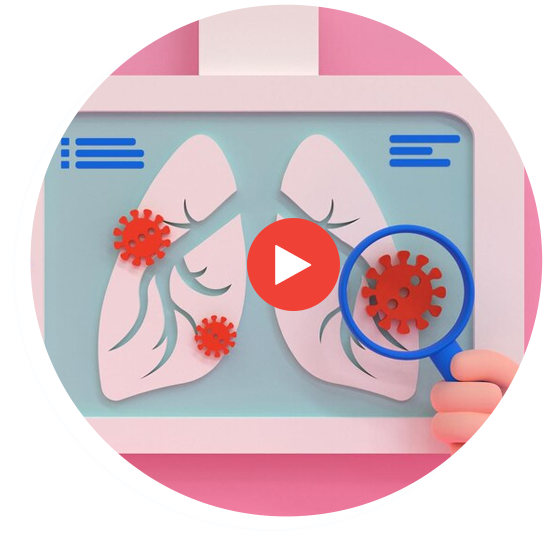

On the other hand, chronic bronchitis or pneumonia is much more severe, affecting 4.6% of the world's population every year and leading to thousands of deaths.
TELMDCARE
What is
Bronchitis?
Bronchitis is a lung infection that affects the main airways, causing irritation, inflammation,
coughing, a buildup of yellow-grey mucus, phlegm, sore throat, and wheezing.
One of the most common types of bronchitis, cold chest or acute bronchitis, affects 44 of 1000
adults annually, with 82% of cases occurring in fall or winter. It can generally last less than
three weeks, leading to swollen lung airways, coughing, and excess phlegm production.
Book an Appointment for Only
TELMDCARE
Is covered by many popular
insurance plans

SYMPTOMS OF
Bronchitis
Coughing is one of the most common bronchitis symptoms that brings up a lot of mucus and phlegm.
However, this does not always happen, so you can always look out for more symptoms like sore
throat, headaches, runny nose, fatigue, body aches, and pains.
These symptoms are also widely synonymous with other throat infections like sinusitis and the
common cold, but if you have bronchitis, you'll notice your suffering will last for a few weeks.
You may also see your cough staying for several weeks even after the other symptoms have
disappeared, making your chest and stomach muscles quite sore.
Inflamed lung airways can also cause shortness of breath and wheezing, but these are more common
with long-term or chronic bronchitis.
Long-term or Chronic Bronchitis Symptoms
Chronic obstructive pulmonary disease (COPD), more commonly known as chronic bronchitis, lasts much longer and is much more persistent than acute bronchitis. As mentioned earlier, the symptoms generally include but aren't limited to wheezing, fatigue, shortness of breath, primarily when exercising or moving around, constant cough, increased mucus and phlegm production, and frequent chest infections. Your chronic bronchitis symptoms are more likely to worsen during the winter and fall seasons, leading to more than a few flare-ups or particularly bad health every year.
Is Prevention Possible?
Even though there are ways to treat and manage your acute bronchitis symptoms effectively, nothing beats the efficacy of prevention methods.
When Should You Seek
Professional Medical Help?
As mentioned earlier, when dealing with acute bronchitis, seeking medical help may be unnecessary, but if your cough is exceptionally severe, lasting for more than a few weeks, it's time to seek professional help.
Treatments and
Managing Symptoms
When it comes to dealing with chronic bronchitis, there is no cure other than not smoking,
staying away from smokers, and living a healthy, fit, and active life.
On the other hand, cases of acute bronchitis do not require professional help and treatments,
and you can essentially manage the symptoms at home by getting plenty of rest, staying hydrated,
taking over-the-counter medication for headaches and fevers.
Staying hydrated thins out the mucus in your lungs, unclogging your airways, making it easier to
breathe and cough out the remaining phlegm. You can also ingest warm liquids like tea, honey,
lemon water, and soups to unclog your airways further and relieve your sore throat.
If you're a regular smoker, quitting the habit or giving it a few days' rest will significantly
help your case, making you recover much faster. Continuing to smoke will only aggravate your
condition, increasing your risk of developing a chronic illness.
Although it may be unnecessary, you can visit a doctor and have them give you prescribed
antibiotics if they fear your condition will worsen. However, since a virus nearly always causes
bronchitis, antibiotics will barely affect and aren't recommended for everyone.
Older adults over the age of 80, premature babies, patients suffering from or having a history
of heart, lung, kidney, or liver diseases and people with a weakened immune system cannot take
antibiotics.
TELMDCARE
As Seen On


Let TelMDCare's Online Doctors
Help You Out
Although bronchitis is not contagious, the symptoms can be triggered by a virus. Since
antibiotics are usually not helpful for this condition, a doctor can help you get better by
developing a treatment plan.
Your doctor will ask you a series of questions during a video consult to determine if your
symptoms are related to bronchitis. After gathering information about your medical history and
the severity of your condition, a treatment plan will be established. In-person examinations may
also be necessary if needed.
An online appointment with our doctors could be just what you need. Online physicians can assess
your symptoms and prescribe medication for the pain. They can also rule out the chances of any
underlying conditions, giving you some much-needed peace of mind and painless sleep.
TELMDCARE
About
Bronchitis
The inflammation of the lining of one's breathing tubes is known as bronchitis. People with this
condition cough up thick mucus, which can then be discolored. It can be either chronic or acute.
Acute bronchitis is usually caused by a respiratory infection. It can also be triggered by
smoking. More serious bronchitis, which is a chronic condition, involves inflammation of the
lining of the tubes.
Bronchitis is often referred to as a chest cold. It can improve in a week or ten days, though
the cough can still remain for several weeks.
If you've had numerous bouts of bronchitis, then you may have chronic bronchitis, a condition
that requires medical attention.

Bronchitis
Symptoms
The symptoms of chronic bronchitis or acute bronchitis can vary. Some of these include coughing,
fatigue, shortness of breath, and a slight fever. Sometimes, the mucus may be streaked with
blood. In addition, chest discomfort and chills can occur.
If you have acute bronchitis, then you may experience some cold symptoms, such as body aches or
mild headaches. However, these symptoms usually go away within a week. On the other hand,
persistent coughs can remain for up to several weeks.
A productive cough, which can last for several months, is referred to as chronic bronchitis. It
can also involve recurring bouts for a couple of years.
If you have chronic bronchitis, then you might experience periods of coughing and other symptoms
that worsen. These could be accompanied by an acute infection.
Medication services available 24/7 for adults and kids (3+)
Top quality, board-certified doctors
No insurance needed
Same-day prescriptions available*
*Prescriptions provided at doctor’s discretion.
TELMDCARE
Bronchitis Causes
The main airways in your lungs are known as the bronchi, and they're located on either side of
your tracheal windpipe. These smaller airways are called bronchioles. The walls of the bronchi
are made of mucus, which helps trap dust and other particles.
Acute bronchitis is usually caused by an infection that causes the walls of the bronchi to
become inflamed and irritated. This can then lead to an increase in mucus production. Smoking is
one of the most common causes of chronic bronchitis. Over time, the damage caused by tobacco
smoke can eventually cause the walls of the bronchi to become damaged.
The primary cause of acute bronchitis is usually a viral infection, similar to what causes flu
and colds. Antibiotics won't kill viruses, so they're not helpful in most cases of bronchitis.
Smoking is another common cause of chronic bronchitis, and it can be triggered by toxic gases or
air pollution in the workplace or in the environment.


TELMDCARE
Bronchitis Risk
Factors
Smoking can increase the risk of chronic bronchitis or acute bronchitis. It can also affect
people who live with smokers.
People with low resistance are more vulnerable to infection. This can be caused by a chronic
condition or an acute illness.
Being exposed to irritants on the job can increase the risk of bronchitis. Examples of these
include textiles or grains.
Repeated bouts of heartburn can worsen your condition and increase your chances of getting
bronchitis.
Bronchitis Diagnosis
Thanks to advancements in technology and the advent of medical tests like throat culture,
bacterial and viral infections like strep throat can easily be diagnosed.
A virtual doctor will assess your throat and tonsil area with a cotton swab, run a strep test
and provide beneficial and quick results within minutes. If you’re
experiencing any of the signs and symptoms mentioned above, seeking strep throat treatment is
the way to go.
Bronchitis Treatment
Most people with bronchitis will be able to clear up on their own within a couple of weeks. This
condition, which is referred to as acute bronchitis, is usually treated with rest and fluids.
The symptoms of bronchitis can last for a long time. If they last for three months or more, it's
referred to as chronic bronchitis. Although it's not a cure, there are various treatments
available to help decrease the severity of the illness. One of the most important factors that
people with bronchitis should consider is avoiding smoking.

Consulting an Online
Doctor for Bronchitis
Inhaled smoke can also be the cause of bronchitis. It can be triggered by respiratory viruses,
such as the one that causes the common cold. Sometimes, bronchitis can be caused by bacterial
infections.
Getting the best possible treatment for bronchitis can be done with our same-day service, which
allows you to meet with a doctor who is online. Our telemedicine doctors for bronchitis will
diagnose and prescribe the necessary medication.
They can also rule out the chances of any underlying conditions, giving you much-needed peace of
mind and painless sleep. Sign up and book an appointment with our specialists to get bronchitis
treatment online today!
TELMDCARE
Sign Up
Sign up and book an appointment with our specialists to get bronchitis treatment online today!
$43 SIGN UP
TELMDCARE
Bronchitis FAQs
Yes, since a virus causes acute bronchitis, it's more likely to transfer from person to person through tiny droplets when you cough or sneeze. In order to reduce any risk of catching this contagious illness, you can do the following: Stay clear of anyone suffering from the flu or other illnesses Keep your hands clean Have a hand sanitizer on you when you're out and about Keep your hands away from your eyes, nose, and mouth Get annual flu shots
Yes, if you have bronchitis, staying hydrated can help you recover much faster. It helps thin out the mucus in bronchial tubes, making it easier to discard.
Even though universal healthcare should be affordable and mandatory, finding the right doctor
and treatment isn't easy. But with TelMDCare, you can consult a virtual doctor for acute
bronchitis, allergies, and other acute conditions.
All you need to do is make an appointment with one of our online doctors, pay an appointment
and consultation fees of $43, and the general practitioner will start by giving you an
official diagnosis, quickly followed by consultation & prescription.
At TelMDCare, our quality medical services are affordable and free, with the first follow-up
costing you nothing. You can chat online with your doctor without any wait-time and
advantage of their suggestion, expertise, and knowledge, finding relief for all your medical
woes.
If your infection lasts for more than a week, get in touch with us or sign up immediately to
make a doctor's appointment.



